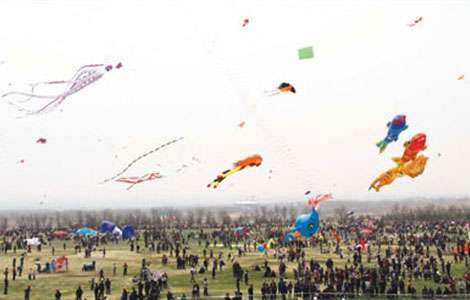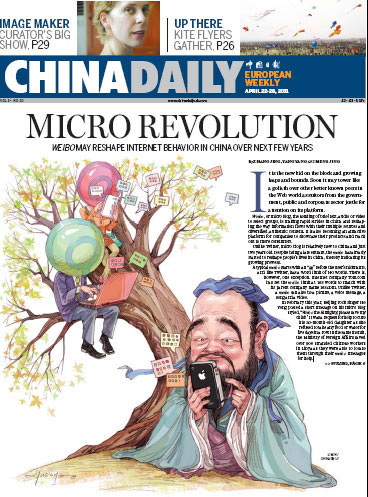Out of the shadow
Updated: 2011-04-22 10:47
By Yang Guang (China Daily European Weekly)
 |
|
Fang Fang believes life is driven by cruel fate. |
A self-declared 'pessimist' of an author seeks upbeat outlook on real life
Fang Fang used to be "the voice" that revealed "distinctly bizarre worlds" from "behind the scenes of life's vastness". The Wuhan-based writer is emerging from the "abyss' darkest corner" to tell the tale of a besieged settlement - the town in which she has always lived.
French poet Charles Baudelaire's The Voice inspired Fang to produce The View (1987), a representative of China's "new realism" literary genre (characterized by indifferently calm narratives), which was prevalent in the late 1980s.
Narrated by the deceased Little Eight, the novella relates the brutish struggle of an illiterate docker's family in the poorest area of Wuhan.
The capital of Central China's Hubei province has set the scenes for her stories from the outset.
"It has been in my mind from the very beginning of my memory," she says.
"My knowledge about the city has grown from a leaf, to a tree and finally to a forest."
Her latest offering, the soon forthcoming Wuchang Town, is no exception. The writer regards it as her best work in years.
Its plot focuses on the 40-day battle (from Sept 1 to Oct 10, 1926) between the northern warlord military and the northern expeditionary army, during the Northern Expedition (1926-1927).
"War brings out the extreme virtues and evils of human nature," Fang writes in the afterword.
"The soldiers were involved in the war for various reasons: Some fought against repression. Others fought because circumstances forced them to. And some fought for the peace and prospects of the country. Their stances made all the difference."
Fang was born into an intellectual family, which she supported by working as a freight loader after high school. She started writing poetry during this period and her first poem was published in 1975.
"The four years as a freight loader was like attending a different sort of university," she says.
"It has acquainted me with the ways of the impoverished urbanite, which was entirely outside of my previous experiences."
Fang studied at Wuhan University from 1978 to 1982 and published her first short story, On a Canvas-Covered Truck, in her senior year.
After graduation, she became a scriptwriter for Hubei TV for seven years before quitting to write full time.
Most of Fang's works are novellas. Her early writings are mainly about the idealism and optimism of youth - works she has come to regret and consider superficial.
The turning point came with her 1986 novella White Dream, an acrimonious satire on the disappointment and frustration of a failed friendship that was inspired by the actual betrayal by a fellow writer friend.
Two types of urban youth - the hurt and lost intellectuals and the struggling workers of the lower social classes - were portrayed in her 1988 novella White Foal and reappear in her subsequent works.
In the partially autobiographical My Grandfather in My Father's Mind (1989), Fang reflects on the lives and attitudes of her grandfather and father, who represent two generations of Chinese intellectuals.
Her grandfather, a scholar of traditional Chinese language and literature, was killed in 1938 during the War of Resistance Against Japanese Aggression (1937-1945).
Her father, a linguist, lived with the fear of persecution during the "cultural revolution" (1966-1976) until his accidental death in 1973.
The experiences of her grandfather and father have greatly influenced Fang's literary interests and understanding of life.
She believes life is driven by cruel fate.
Humankind is helpless in the face of reality but refuses to easily surrender. The resulting tension is what she seeks to convey.
According to Han Shaogong, author of A Dictionary of Maqiao, the secret of Fang's success is this: A good writer reflects the colorful, complex and ever-changing life without losing that complexity.
Fang's stories are permeated by German Franz Kafka's absurdity and French Jean-Paul Sartre's nihilism.
Her protagonists try to realize the meaning of existence, but often end up in failure and sometimes even death.
The utilitarian Seventh Brother in The View, who manages to rise above poverty and maintains a well-to-do life, compares life to a leaf, which buds in the spring only to wither in the autumn.
"I can't help but be pessimistic when I'm writing, because this is the way life is," she says.
"But when I'm actually living life, I try to be upbeat."
E-paper

Blowing in the wind
High-Flyers from around the world recently traveled to home of the kite for a very special event.
Image maker
Changing fortunes
Two motherlands
Specials

Models gear up car sales
Beauty helps steer buyers as market accelerates.

Urban breathing space
City park at heart of Changchun positions itself as top tourism attraction

On a roll
Auto hub Changchun also sets its sight on taking lead in railway sector
